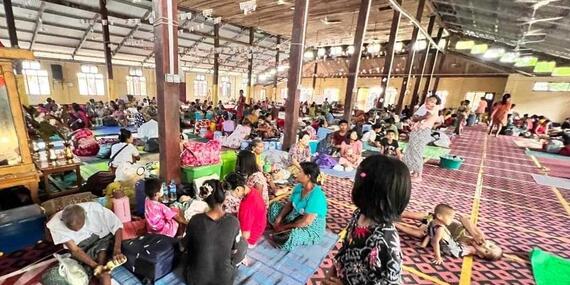Today's top news: Myanmar, Ukraine, Sudan, Rwanda, Haiti

Myanmar
Almost one month on since Cyclone Mocha, our humanitarian colleagues warn about the deterioration of humanitarian access in cyclone-hit Rakhine state.
Existing travel authorizations were temporarily suspended yesterday 8th June, pending centralized decisions in Nay Pyi Taw.
Initial approval for humanitarian distribution and transportation plans for cyclone-affected townships in Rakhine have also been rescinded.
Some of the replenishment of relief supplies from outside the country are also pending. The suspension of access will affect hundreds of thousands of people in Rakhine.
Since the cyclone, more than 110,000 affected people have received shelter and essential relief items in Rakhine and the Northwest (Chin, Sagaing and Magway).
Nearly 300,000 affected people in Rakhine alone have received food assistance. Partners were distributing seeds and organic fertilizers to provide families with food to eat and sell. However, these distributions have also been paused, impacting efforts to combat food insecurity.
Suspension of activities coincides with monsoon arrival when urgent scale-up of the response is needed in the impact zone.
Ukraine
The Humanitarian Coordinator Denise Brown spoke to reporters this morning from Bilozerka, on the west bank of Dnipro, just 1.5 km from the front line.
This is one of the areas worst affected by the destruction of Kakhovka Dam, which happened in the early hours of 6 June.
Ms. Brown said that although initial estimates indicate that 17,000 people are affected in the areas controlled by Ukraine alone, it is important to understand that the crisis has not stopped and is evolving rapidly and numbers are changing by the minute. She highlighted the impact of the disaster on agriculture, water, energy, and mine contamination.
As you know, the disaster has also affected people in areas under Russian Control, but the UN currently has no access to this part of the country.
Denise Brown was in Bilozerka today as we led an inter-agency humanitarian convoy today to support 6,000 people in this community.
The UN Refugee Agency, UN Children’s Fund, International Organization for Migration, World Health Organization and the World Food Programme provided critical life-saving assistance, including ready-to-eat food, bottles of water, water bladders, hygiene kit, jerrycan, solar lamps. Medical kits and medicines were also provided.
Denise Brown met with local authorities and members of the community who had received aid on the day of the dam breach.
From Bilozerka, Denise Brown went to Kherson, where she met with the Governor and had further discussions on the needs of people impacted by this catastrophe.
Sudan
And we have an update for you on humanitarian operations in the Darfur region of Sudan. Yesterday, OCHA coordinated the movement of 11 trucks carrying food assistance in North Darfur.
We continue to be alarmed by the appalling levels of violence in the Darfur region. Some 8.6 million people there urgently need assistance. Civilians, and the humanitarian workers who are risking their lives to help them, must be protected.
Across Sudan, the humanitarian community was able to reach some 1.8 million people with life-saving assistance in April and May. Despite the challenges, 68 humanitarian organizations continue to expand their operations to reach people around the country.
Since resuming operations in Sudan in early May, the World Food Programme has provided emergency food and nutrition assistance to more than 817,000 people in 14 of Sudan’s 18 states. That also includes some of the hardest-to-reach areas in the Darfur region.
Rwanda
UN Emergency Relief Coordinator, Martin Griffiths, has allocated US$1.5 million from the Central Emergency Response Fund to support the Government-led response to the deadly floods and landslides which struck the country in early May.
With this funding, UN agencies and partners will provide critical food security assistance, health care, shelter materials and basic household items to people who were displaced by the floods and landslides.
As you may recall, the northern, western, and southern provinces of Rwanda were hit by heavy rainfalls in May causing deadly floods and landslides. 135 people lost their lives and 18,000 have been displaced. Homes, roads, as well as crops and livestock were also heavily impacted.
Haiti
We have an update on relief efforts in Haiti, where we’re working with authorities, NGOs and the private sector to respond to the flooding and landslides unleashed by those torrential rains over the weekend.
The General Directorate for Civil Protection says more than 41,000 households have been affected by the disaster.
So far, we have delivered hot meals to more than 500 people living in the Port-au-Prince metropolitan area – with more distributions planned in the coming days.
OCHA and UN agencies are also gearing up to provide food and other assistance to additional areas around the capital.
But as you’re aware, the humanitarian response is incredibly difficult due to insecurity and gang activity, which has led to soaring logistical costs.
